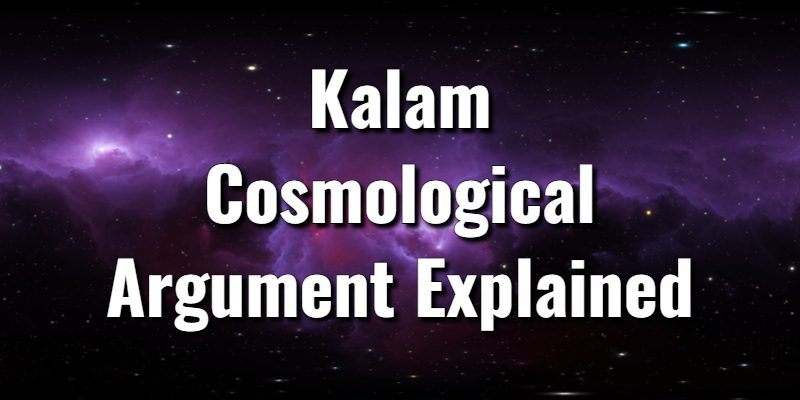How did you get here? How you answer that question affects how you live your life. Children accept answers like “the stork” or “the cabbage patch.” Adults look for a deeper explanation of not only how we got here but how everything else did, too. Christians find the answers in special revelation (the Bible) and general revelation (nature). The psalmist writes in Psalm 19:1, “The heavens declare the glory of God; and the firmament sheweth his handiwork.” Looking at the sun, moon, and stars, common sense and experience tell us that it all didn’t come into being by chance. After all, if objects and systems could spring into existence, why don’t we witness that happening all the time?
The Christian Answer to the Question of Origins: The Kalam Cosmological Argument Explained

Craig presents the argument deductively, as the following syllogism:
- Whatever begins to exist has a cause.
- The universe began to exist.
- The universe has a cause.
If the first two premises are true, the third must be true.
But where is God in this argument? Atheists and agnostics often point out that the kalam does not prove that God is the cause. This is true: The last sentence in the syllogism points to a cause but doesn’t claim that cause is God. But the kalam is meant to be just one part of a cumulative case for the existence of God. Think of it as a starting point.
Lord’s Library has compiled these web resources to help you become familiar with this argument:
The Kalam Cosmological Argument Explained: Web Resources to Consider
The Kalam Cosmological Argument, Parts 1 and 2 from drcraigvideos
Einstein defined genius as “making the complex simple.” That applies to these high-quality, animated videos. They explain the kalam argument from scientific and philosophical perspectives, yet they’re simple enough for neophytes. Non-theists are the target audience, but the videos are also useful for theists as a streamlined summary of one reason to believe in a cause for the universe (and to subsequently identify that cause as God).
If you enjoy Dr. Craig’s material and want to explore the argument in more depth, check out his lecture and Q & A session on the kalam cosmological argument in his Defenders series podcast.
Arguments for God’s Existence from Inspiring Philosophy
Michael Jones, Christian founder of the non-profit organization Inspiring Philosophy, uses scientific, historical, and philosophical research to make a case for a theistic worldview. His three-video series on the cosmological arguments for God’s existence explains the argument in layman’s terms and presents and refutes the most common objections.
All three videos total fewer than thirty minutes but are full of easy-to-understand explanations, including quotes and commentary by respected Christian and atheist thinkers.
Gotquestions.org Addresses the Kalam
Using their signature lucid question and answer style, the folks at Got Questions offer a written explanation of the kalam. Their answer includes the history of the argument and a concise elucidation. They use examples to help readers grasp concepts like the impossibility of an actual infinity (which targets the second premise in the argument) and “horizontal” causality.
One effective way to show people God REALLY exists (with objections answered) with Mike Winger and Braxton Hunter
Mike Winger is a Christian apologist and the host of the Bible Thinker YouTube channel. His website addresses nearly any Biblical and theological question you can think of, including the Kalam argument. In this video (originally live streamed), his guest is Braxton Hunter, the President of Trinity Bible College. The two discuss the kalam cosmological argument, answer objections, and at the end, take questions from viewers.
Blake Giunta’s Beliefmap.org
Blake Giunta is a Christian apologist and founder of beliefmap.org. The website contains outlines/flowcharts of the most debated arguments for belief in God, cited support for each argument, and objections with rebuttals. Giunta’s site addresses the premises that comprise the kalam syllogism.
Many Christian apologists have resource sites, but none is quite like this one. Giunta describes the mobile-friendly site as a “pocket apologist” that “simulates dialogue.” Theists can bookmark this for quick access to conversing with non-theists.
Final Thoughts
In Paul’s letter to the Romans, under the guidance of the Holy Spirit, he writes in Romans 1:20:
“For the invisible things of him from the creation of the world are clearly seen, being understood by the things that are made, even his eternal power and Godhead; so that they are without excuse:”
The Kalam Cosmological Argument serves an important ministry purpose: It is a small opening in the door that can lead non-theists to God.
NOW READ: The Moral Argument in Apologetics: Web Resources to Consider
Lord's Library participates in affiliate programs. We may make a small commission from products purchased through this resource.
- Intelligent Design vs. Evolution: Six Web Resources to Consider - October 3, 2023
- Microevolution vs. Macroevolution: Six Web Resources to Consider - September 9, 2023
- Atheist Objection to Theism #4: Presumption of Atheism Argument - August 21, 2023












